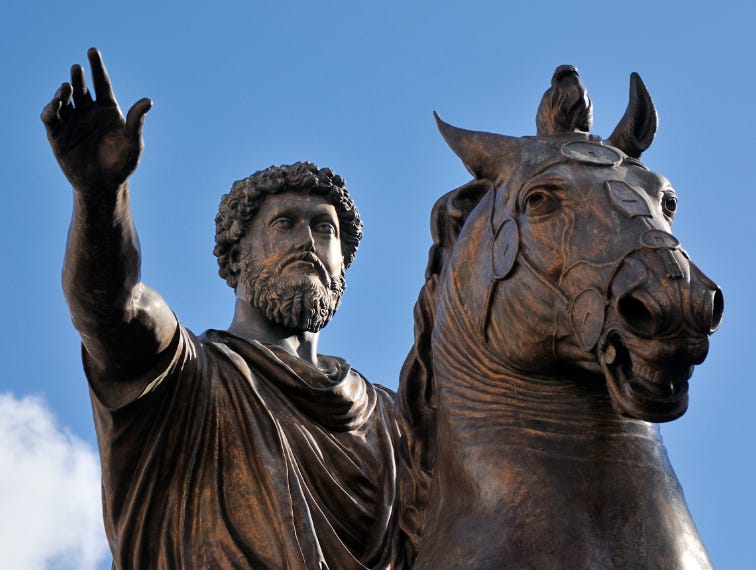When I first began trading seriously during the COVID pandemic, I was completely driven by FOMO (fear of missing out) and FUD (fear uncertainty doubt), the wild ups and downs of the market pushed me into making impulsive decisions. This inevitably led to getting burned. After taking some painful losses, I became hesitant, almost fearful of executing trades, which left me feeling stuck and frustrated. As members of the InvestAnswers community, we’re privileged to have access to world-class trading models and tools. Yet, sometimes it feels like being handed the controls of a fighter jet—it's not just about having the best equipment; you also need the proper training and, more importantly, the a fighter pilot’s mental fortitude in order to fly it safely.
In 2023, a friend gifted me a copy of Ryan Holiday's "The Obstacle Is the Way" for Christmas, and it turned out to be a game-changer for me. As I read it for the first time, I felt compelled to try some of the Stoic teachings in my daily life. Over the past year, I've found that these practices have been incredibly valuable, especially when it comes to my finances and managing my trading psychology.
Adopting a Stoic mindset has not only helped me stay grounded and resilient in the face of market fluctuations, but it has also transformed my entire approach to trading, leading to much greater success. Now, I feel a strongly to share this Stoic trading mentality with the community, hoping others can find the same clarity and benefits that I have.
What is Stoicism?
Stoicism is an ancient Greek philosophy that encourages individuals to cultivate virtues such as wisdom, emotional resilience, and self-control to achieve a tranquil and fulfilling life, regardless of external circumstances. It emphasizes the importance of distinguishing between what is within our control—our thoughts, actions, and responses—and what is not, such as external events, the actions of others, or the market. By focusing on what we can control and letting go of what we cannot, Stoicism aims to foster a mindset of inner peace so that one can make rational life decisions.
Why Stoicism Can Help Me With Trading?
In the book "The Obstacle Is the Way", it talks about the story of Colonel James Stockdale, a U.S. Navy officer, who was shot down and captured during the Vietnam War. He spent over seven years as a prisoner in the infamous "Hanoi Hilton" where he endured torture, humiliation, and solitary confinement. During his captivity, Stockdale noticed that his fellow POWs who held onto high hopes of imminent rescue often had those hopes repeatedly crushed, leading them to despair, and many of them ultimately did not survive. In contrast, those who adopted a more Stoic approach—accepting their harsh reality while maintaining a steady, long-term commitment to survive—were better able to cope with the hardships and were more likely to make it out of captivity.
While the world of trading cannot be compared to the horrors of war, there is a valuable lesson to be drawn from Stockdale's experience. Just as the POWs who clung to unrealistic hopes faltered, traders who obsess over quick gains or expect only to make money will be easily shaken by market volatility, leading to poor decision-making and emotional distress. Instead, traders that accept the market fluctuations and embrace the fact that losses are inevitable are more mentally equip to withstand the oncoming storm. Stoicism helps traders to manage this process. It calls for focusing on what is within our control—such as our strategy, discipline, fundamental analysis, technical analysis, etc. This allows us to stay grounded, avoid impulsive reactions, and maintain a steady course during times of high volatility.
How to Implement Stoicism In My Trading?
Implementing Stoicism in trading involves cultivating a mindset of emotional resilience, focusing on what is within your control, and letting go of what's not in your control. The way I have been able to build up this mindset is to practice these three habits regularly: (1) Process Discipline, (2) Self Reflection, and (3) Emotional Detachment.
1. Process Discipline:
In trading, the outcome is never fully within our control, but the process always is. The Stoic approach emphasizes process discipline—developing a solid strategy, executing it to the letter, trusting in the process regardless of short-term results, and making adjustments based on logic rather than emotion.
In trading, this has meant shifting my mindset from obsessing over individual wins and losses to concentrating on the steps I take each day. I’ve made it a habit to develop and refine a well-structured trading plan, one that includes clear rules for entry, exit, and risk management. Every time I trade, I remind myself that my job is not to predict the market, but to execute my plan with discipline and consistency.
Reflecting on my trades is another key aspect of my Stoic approach. At the end of each trading session, I don't just review my trades based on outcomes, but by how well I adhered to my strategy, how well did I used the tools in my tool bag (IADSS, ATR, PTOS, etc.), and noting areas for improvement. Did I adhere to my entry and exit rules? Did I manage risk according to my strategy? Where did I deviate, and why? Does my plan need to be revised? This kind of introspection helps me identify emotional triggers, such as fear or greed, that might have influenced my decisions. By journaling these reflections and continuously tweaking my approach based on what I learn, I’m not only refining my strategy, but also training my mind to remain focused on what I can control. Over time, this has allowed me to build confidence, maintain emotional stability, and achieve more better results in trading and in life.
2. Self Examination:
Stoics, like Marcus Aurelius, practiced daily self reflection to review their actions, thoughts, and feelings. This helps in understanding one's progress, recognizing mistakes, and reinforcing virtuous behavior. In trading, understanding yourself and engaging in constant examination is critical because it allows you to identify patterns in your behavior that may be sabotaging your success. By regularly reflecting on your decisions, emotional responses, and the outcomes of your trades, you can pinpoint areas where fear, greed, or overconfidence that might cloud your judgment. This requires identifying personal patterns, such as tendencies to overtrade, panic sell, or hold on to losses, and actively working to counter them. This level of self-awareness helps you refine your strategy, improve your decision-making process, and develop the emotional discipline needed to stay consistent.
In terms of trading, my self reflection has been about gaining a deeper understanding of my strengths, weaknesses, and the emotional triggers that affect my trading decisions. One of my strengths is my analytical approach; I enjoy diving into data, spotting patterns, and developing strategies based on logical frameworks. However, I've also come to recognize that I have a tendency to overanalyze, which can lead to hesitation or paralysis by analysis—where I miss opportunities because I'm waiting for more confirmation. Also, sometimes the data is incomplete and you have to trust your gut. Afterall, trading is about taking risk. The Investor Profiler was quite a helpful for identifying this blind spot (I'm a Craftsman). Now what I do is set rules that limit the amount of time I spend analyzing a trade and intentionally take decisive actions.
Understanding yourself and your own tendencies in different market conditions is crucial. Recognizing whether you sell too early or too late, or if you have a habit of buying at market tops or catching falling knives, can help you identify patterns that might be working against you. This way you can correct for these tendencies when the situations arise.
3. Emotional Detachment:
Practicing emotional detachment in my trading has been another cornerstone to my method. I've learned to treat every trade as just another step in the process, rather than becoming emotionally attached to any single outcome, asset, or company. It's essential to see assets and companies for what they truly are, numbers on a screen. When you get emotionally attached to a particular asset or company, you start to project personal biases and beliefs onto it, which can cloud your judgment and lead to poor decision-making. Instead of seeing an asset as a beloved stock or a "can't-miss" opportunity, see it simply as a series of price movements and patterns that are part of a larger market system. Remember, no asset owes you anything, and no company is inherently "special" in the world of trading. Detaching emotionally from these entities allows you to evaluate them objectively, based purely on data, trends, and the strategic criteria set in your trading plan.
By treating assets as just numbers, I was able to avoid the trap of becoming overly committed to a single trade and I was able to let go of my ego. It becomes easier for me to cut losses and not "fall in love" with a position just because I had a lot invested in that position for a long time. Just like in the Matrix, when Neo saw the Matrix as just pieces of code, I see trading as just a game of numbers and probabilities. This allows me to maintain flexibility and look at the whole market for opportunities. Further, this has allowed me to enjoy trading more, because I treat it as a game and therefore I can enjoy it as a game.
Conclusion
Embracing Stoicism has drastically transformed my approach to trading. This mindset has allowed me to stay grounded and composed, regardless of the market's fluctuations. Ultimately, trading is about more than just financial gains; it is a journey of personal growth, resilience, and self-mastery. Stoicism teaches us to embrace our fate (Amor Fati), and in trading, this means accepting the market's unpredictability while enjoying the journey.



